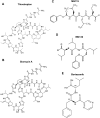A new target for proteasome inhibitors: FoxM1
- PMID: 20074015
- PMCID: PMC3532816
- DOI: 10.1517/13543780903563364
A new target for proteasome inhibitors: FoxM1
Abstract
Importance of the field: The proteasome is responsible for ubiquitin- and ATP-dependent proteolysis of cellular proteins. The latest advances in proteasome studies led to the development of proteasome inhibitors as drugs against human cancer. It has been shown that proteasome inhibitors selectively kill cancer, but not normal cells. However, the exact mechanisms of the anticancer activity of proteasome inhibitors are not well understood. The oncogenic transcription factor Forkhead Box M1 (FoxM1) is overexpressed in a majority of human carcinomas, while its expression is usually low in normal cells. In addition, FoxM1 may also drive tumor invasion, angiogenesis and metastasis. For these reasons, FoxM1 is an attractive target for anticancer drugs.
Areas covered in this review: My aim is to discuss recent publications that point out novel mechanism of action of proteasome inhibitors. In addition, I describe the identification of new types of proteasome inhibitors, called thiazole antibiotics. Using a cell-based screening system, the thiazole antibiotics siomycin A and thiostrepton were isolated as inhibitors of FoxM1 transcriptional activity and expression. Paradoxically, it has been shown that these drugs also stabilize the expression of other proteins and act as proteasome inhibitors in vitro. Moreover, it was found that well-known proteasome inhibitors, such as MG115, MG132 and bortezomib, inhibit FoxM1 transcriptional activity and FoxM1 expression.
What the reader will gain: It has been shown that proteasome inhibitors suppress FoxM1 expression and simultaneously induce apoptosis in human tumor cell lines. This review describes the correlation between negative regulation of FoxM1 by proteasome inhibitors and apoptosis, and suggests that negative regulation of FoxM1 is a universal feature of these drugs and may contribute to their anticancer activity.
Take home message: Oncogenic transcription factor FoxM1 is upregulated in a majority of human cancers, suggesting that growth of cancer cells may depend on FoxM1 activity. A short time ago, it has been shown that proteasome inhibitors simultaneously inhibit FoxM1 expression and induce apoptosis in human cancer cells. This effect may explain specificity of proteasome inhibitors to induce apoptosis in cancer, but not in normal cells. Now, it is critical to determine the role of suppression of FoxM1 in apoptosis induced by proteasome inhibitors and to establish how significant the inhibition of FoxM1 is for the anticancer activity of proteasome inhibitors.
Figures


Similar articles
-
FoxM1 is a general target for proteasome inhibitors.PLoS One. 2009 Aug 12;4(8):e6593. doi: 10.1371/journal.pone.0006593. PLoS One. 2009. PMID: 19672316 Free PMC article.
-
Thiazole antibiotics target FoxM1 and induce apoptosis in human cancer cells.PLoS One. 2009;4(5):e5592. doi: 10.1371/journal.pone.0005592. Epub 2009 May 18. PLoS One. 2009. PMID: 19440351 Free PMC article.
-
FoxM1 inhibitors as potential anticancer drugs.Expert Opin Ther Targets. 2008 Jun;12(6):663-5. doi: 10.1517/14728222.12.6.663. Expert Opin Ther Targets. 2008. PMID: 18479213
-
Targeting FOXM1 in cancer.Biochem Pharmacol. 2013 Mar 1;85(5):644-652. doi: 10.1016/j.bcp.2012.10.013. Epub 2012 Oct 24. Biochem Pharmacol. 2013. PMID: 23103567 Review.
-
Suppression of the Oncogenic Transcription Factor FOXM1 by Proteasome Inhibitors.Scientifica (Cairo). 2014;2014:596528. doi: 10.1155/2014/596528. Epub 2014 Jun 24. Scientifica (Cairo). 2014. PMID: 25093142 Free PMC article. Review.
Cited by
-
A Novel Function of Molecular Chaperone HSP70: SUPPRESSION OF ONCOGENIC FOXM1 AFTER PROTEOTOXIC STRESS.J Biol Chem. 2016 Jan 1;291(1):142-8. doi: 10.1074/jbc.M115.678227. Epub 2015 Nov 11. J Biol Chem. 2016. PMID: 26559972 Free PMC article.
-
Functional Characterization of Circulating Tumor Cells (CTCs) from Metastatic ER+/HER2- Breast Cancer Reveals Dependence on HER2 and FOXM1 for Endocrine Therapy Resistance and Tumor Cell Survival: Implications for Treatment of ER+/HER2- Breast Cancer.Cancers (Basel). 2021 Apr 10;13(8):1810. doi: 10.3390/cancers13081810. Cancers (Basel). 2021. PMID: 33920089 Free PMC article.
-
FOXM1 Inhibition in Ovarian Cancer Tissue Cultures Affects Individual Treatment Susceptibility Ex Vivo.Cancers (Basel). 2021 Feb 25;13(5):956. doi: 10.3390/cancers13050956. Cancers (Basel). 2021. PMID: 33668819 Free PMC article.
-
ROS inhibitor N-acetyl-L-cysteine antagonizes the activity of proteasome inhibitors.Biochem J. 2013 Sep 1;454(2):201-8. doi: 10.1042/BJ20130282. Biochem J. 2013. PMID: 23772801 Free PMC article.
-
Maternal embryonic leucine zipper kinase: key kinase for stem cell phenotype in glioma and other cancers.Mol Cancer Ther. 2014 Jun;13(6):1393-8. doi: 10.1158/1535-7163.MCT-13-0764. Epub 2014 May 2. Mol Cancer Ther. 2014. PMID: 24795222 Free PMC article. Review.
References
-
- Rubin DM, Finley D. Proteolysis. The proteasome: a protein-degrading organelle? Curr Biol. 1995 Aug 1;5(8):854–8. - PubMed
-
- Mitsiades N, Mitsiades CS, Richardson PG, Poulaki V, Tai YT, Chauhan D, et al. The proteasome inhibitor PS-341 potentiates sensitivity of multiple myeloma cells to conventional chemotherapeutic agents: therapeutic applications. Blood. 2003 Mar 15;101(6):2377–80. - PubMed
-
- Chan DW, Yu SY, Chiu PM, Yao KM, Liu VW, Cheung AN, et al. Over-expression of FOXM1 transcription factor is associated with cervical cancer progression and pathogenesis. The Journal of pathology. 2008 Jul;215(3):245–52. - PubMed
-
- Fernandez Y, Verhaegen M, Miller TP, Rush JL, Steiner P, Opipari AW, Jr, et al. Differential regulation of noxa in normal melanocytes and melanoma cells by proteasome inhibition: therapeutic implications. Cancer research. 2005 Jul 15;65(14):6294–304. - PubMed
Publication types
MeSH terms
Substances
Grants and funding
LinkOut - more resources
Full Text Sources
Other Literature Sources
Research Materials
Miscellaneous
